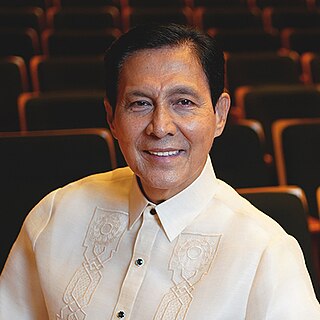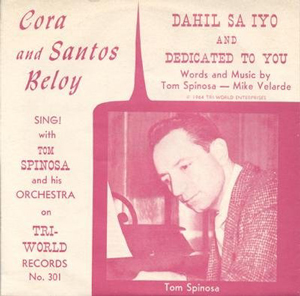Related Research Articles

"Lupang Hinirang", originally titled in Spanish as "Marcha Nacional Filipina", and commonly and informally known by its incipit "Bayang Magiliw", is the national anthem of the Philippines. Its music was composed in 1898 by Julián Felipe, and the lyrics were adopted from the Spanish poem "Filipinas", written by José Palma in 1899.

The president of the Philippines is the head of state, head of government and chief executive of the Philippines. The president leads the executive branch of the Philippine government and is the commander-in-chief of the Armed Forces of the Philippines.
Philippine Airlines (PAL), known as Philippine Air Lines until 1970, is the flag carrier of the Philippines. Headquartered at the PNB Financial Center in Pasay, the airline was founded in 1941 and is the first and oldest commercial airline in Asia.

Levi Celerio was a Filipino composer and lyricist who is credited with writing over 4,000 songs. Celerio was recognized as a National Artist of the Philippines for Music and Literature in 1997.

The 2005 Southeast Asian Games, officially known as the 23rd Southeast Asian Games, was a Southeast Asian multi-sport event held in Manila, Philippines.

Raymundo Cipriano Pujante Cayabyab, known professionally as Ryan Cayabyab, is a Filipino musician, composer and conductor. Regarded as one of the pillars and icons of Original Pilipino Music (OPM). He was the Executive and Artistic Director for several years for the defunct San Miguel Foundation for the Performing Arts. He was named National Artist of the Philippines for Music in 2018.
Ruben Tagalog was a Filipino actor and musician, famous for his works in the Kundiman style. He was also one of the founders of the singing group Mabuhay Singers. He is known as the Father of Kundiman. He performed for the Japanese during the their occupation of the Philippines.
Geneva Mendoza Cruz is a multi-platinum Filipina singer and actress known for her hit songs, “Anak Ng Pasig” and “Kailan” (When). She was discovered and mentored by National Artist of the Philippines for Music, Ryan Cayabyab who formed the defunct iconic music group Smokey Mountain, which she was a member of. She just recently moved back to Manila, The Philippines, from The United States, where she worked as A weight-loss coach for a few years.

"Bayan Ko" is one of the most recognizable patriotic songs of the Philippines. It was written in Spanish by the revolutionary general José Alejandrino in light of the Philippine–American War and subsequent American occupation, and translated into Tagalog some three decades later by the poet José Corazón de Jesús.

Tirso Silvano Cruz III is a Filipino actor, comedian, and singer. He currently serves as the Chairperson of the Film Development Council of the Philippines. Regarded as a "matinee idol", Cruz is a FAMAS Award and Gawad Urian Award recipient.

"Dahil Sa Iyo" is a song by Mike Velarde, Jr., written in 1938 for the movie, Bituing Marikit and sung by Rogelio de la Rosa. A version with English-Tagalog lyrics, recorded in 1964, was a hit in the United States and continues to be popular in Filipino communities on American soil.

Dolores Paterno e Ignacio was a Filipina composer known for the song "La Flor de Manila".

Manuel L. Quezon Avenue, more often called as Quezon Avenue, or simply Quezon Ave, is a 6.1-kilometer (3.8 mi) major thoroughfare in Metro Manila named after President Manuel Luis Quezon, the second president of the Philippines. The avenue starts at the Quezon Memorial Circle and runs through to the Mabuhay Rotonda near the boundary of Quezon City and Manila.

The 2019 Southeast Asian Games, officially known as the 30th Southeast Asian Games, or the 30th SEA Games, and commonly known as Philippines 2019, was the 30th edition of the Southeast Asian Games, a biennial regional multi-sport event which was held in the Philippines from 30 November to 11 December 2019. However, due to a narrow calendar, some sports started before the opening ceremony as early as November 24.
"Manila" is a song by Filipino band Hotdog. The song is written about love for the Philippines, most specifically its capital, and tells about a man who misses his home country while living in another country for years. The upbeat song was inspired by Tony Bennett's hit single, "I Left My Heart in San Francisco". It topped the radio charts in 1976.

The Welcome Rotonda, officially Mabuhay Rotonda, is a roundabout in Quezon City in the Philippines. It is located a few meters from Quezon City's border with Manila, at the intersection of E. Rodriguez, Sr. Boulevard, Mayon Street, Quezon Avenue, Nicanor Ramirez Street, and España Boulevard. It may also refer to the monument situated on its central island.

The space program of the Philippines is currently maintained by the Philippine Space Agency (PhilSA) together with various agencies under the Department of Science and Technology (DOST). The space program includes space research and development, and is funded through the National SPACE Development Program (NSDP) by the DOST and received an initial budget of ₱1 billion in 2020.

The opening ceremony of the 2019 Southeast Asian Games took place on the evening of Saturday November 30, 2019 at the Philippine Arena, in Bocaue, Bulacan. The event commenced at 19:00 PST (UTC+08:00) and ended at 20:35 local time. Floy Quintos was the creative director of the ceremony. The ceremony featured LED strips and panels, which represent a bamboo forest, and was the first indoor opening ceremony of the Southeast Asian Games.

Mabuhay (transl. Welcome), also known as Mabuhay Magazine, is a monthly publication that serves as the inflight magazine of Philippine Airlines. Since July 2016 the magazine has been published by London-based Ink Global.
References
- 1 2 3 4 5 6 7 Walsh, Thomas (2013). Tin Pan Alley and the Philippines: American Songs of War And Love, 1898-1946, A Resource Guide. Scarecrow Press. pp. 272–273. ISBN 978-0810886094.
- 1 2 3 "Tirso Cruz: Composer of Mabuhay — My Philippines". Philippine Star . October 28, 2017. Retrieved June 30, 2018.
- 1 2 Rockell, Kim (January 2013). "The Philippine Rondalla: A Gift of Musical Heritage in a Migrant Contex". International Journal of Asia Pacific Studies. 9 (1): 116.
- ↑ Tann, Avianne (June 25, 2015). "26 Filipino Words Now Officially Part Of The English Language". BuzzFeed . Retrieved June 30, 2018.
- ↑ "State Advertising Plans of Nevadans Unlimited are Outlined by New Director". Reno Gazette-Journal. September 8, 1937. Retrieved June 30, 2018.(subscription required)
- ↑ "Globe Trotter Tells of Philippine Wonders". Detroit Free Press . October 12, 1930. Retrieved June 30, 2018.(subscription required)
- ↑ Defeo, Reuben (June 16, 2003). "Mabuhay Joya!". Philippine Star . Retrieved June 30, 2018.